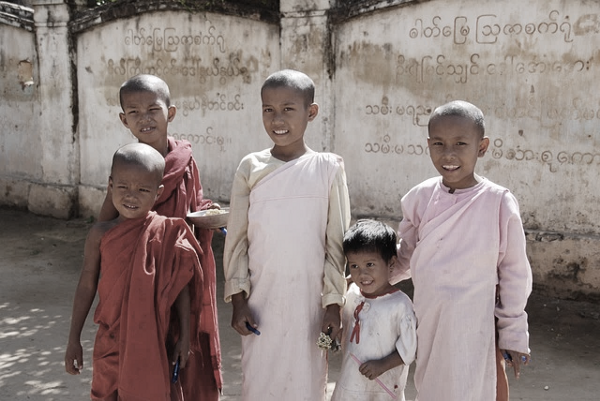The need for Inclusion of Ethnic Minorities in Genetic Research | Dr. Axel Schumacher
Genomics is quickly becoming integrated into our health-care systems, and uncovering diagnoses for many diseases that were previously genetic mysteries. However, current genomic databases despite being extremely valuable for research, often lack a diverse representation of ethnic groups from around the globe. The lack of diversity limits the ability of ethnic minorities to benefit from advances in healthcare. Genomic databases mostly contain data from individuals of European descent. As a result, those genome-catalogues do not represent the global population, but merely the ‘white’ Caucasian population.
Why is this important? To understand how diseases are influenced by our genes scientists must determine how often certain genetic variants occur in healthy people. If the variant is very common in the population, it is unlikely to be harmful; simply because disease genes are unlikely to be transmitted over generations. Collecting all this information determines what is ‘normal’ in a given population and which variants may cause complications.
Indeed, people from African and Asian ancestry are currently more likely than those of European ancestry to receive ambiguous genetic test results after genome sequencing, or be told that they have variants of unknown significance2. That lack of coverage means that that some populations are still being left behind on the road to precision medicine and geneticists will continue to miss important information about disease biology. For example, many African Americans are being misdiagnosed with a disease called Hypertrophic cardiomyopathy, an inherited heart condition that can cause sudden cardiac death. The reason is that those people were under-represented in the databases that were used for comparison. Variants that doctors thought caused the disease, and were regularly used to provide patients with positive diagnoses, were actually found to be common among healthy African Americans3 for whom these variants were normal. Patients were sent home with diagnoses of hypertrophic cardiomyopathy who didn’t actually have the disease. For others, healthcare providers are unable to provide them with a proper diagnosis, or prescribe unnecessary preventative treatments. Such situations happen often in minorities, a problematic situation because individuals from these groups often present with genetic conditions unique to their communities.
There are many reasons for this situation, some populations are easily bypassed. For example, people may have limited access to modern medical centers (like in rural areas), or decide not to contribute their samples to research due to cultural or historical reasons. Obviously, we must diversify genomic databases so that everyone can benefit equally from the genetic revolution.
To move the field forward, we at Shivom started a large-scale project in collaboration with local doctors and medical centers in the Punjab province in India to sequence population subgroups that are typically not showing up in the established genomics databases. The study cohort will primarily be composed of individuals from a remote rural area, from underprivileged/poor individuals in several urban regions (those that have no housing and/or medical support), and patients of several hospitals, e.g., with severe inborn diseases. The northern part of India has more than 220 ethnic groups living in very diverse topographies. The economic burden in dealing with health issues could be reduced by precision medicine, which could be achieved by use of detailed genetic information. The Shivom Project will lead to a new understanding of the different ethnic groups of Asia, a region with the highest diversity of ethnic groups, and which puts this part of India in a unique position for the mapping of the human genome.
Getting reliable genomics and phenotypic/peripheral health data from low-income countries will dramatically change health outcomes and prepares the global community to deal with neglected diseases and even disease outbreaks. Acquiring large amounts of genomic data from patients and healthy people in Africa, Asia, the Middle East and other regions will become increasingly vital to correctly assess and annotate disease variants. Long-term, all human groups need to be well presented in genomic databases.
Together, by sharing underrepresented anonymized genomic information, we are making genome sequencing more useful and actionable for researchers and healthcare professionals — to benefit all people, all over the world.
— By Dr.Axel Schumacher(CEO of Project SHIVOM)
Thanks for your research & your article.......
your work is great
Thank you. Keep supporting
A great rescue project
Thank you for the support.
https://shivom.io/
#OMX #ProjectShivom #Blockchain #healthcare #genomics
#blockchain #btc #cryptonews #crypto #cryptocurrency #token #tokensale #privatesale #bitcoin #ico #investor #investman #bountyhero #hero
http://bountyhero.org/
Shivom are changing the dynamics of the global healthcare market. We are utilizing the most advanced technologies including blockchain, cloud computing, genome sequencing, artificial intelligence, and big data analytics to bring medical genomics into a new era.
#OMX #ProjectShivom #Blockchain #healthcare #genomics #cryptocurrency
You doing a great Job.God Bless You.
Thanks for your support.
Very good article, thanks. (fb)
thanks. Keep supporting.
Great post! I Just upvoted you.
Check my twitch stream for some Chill and relaxing music
Thanks for your comment
Nice